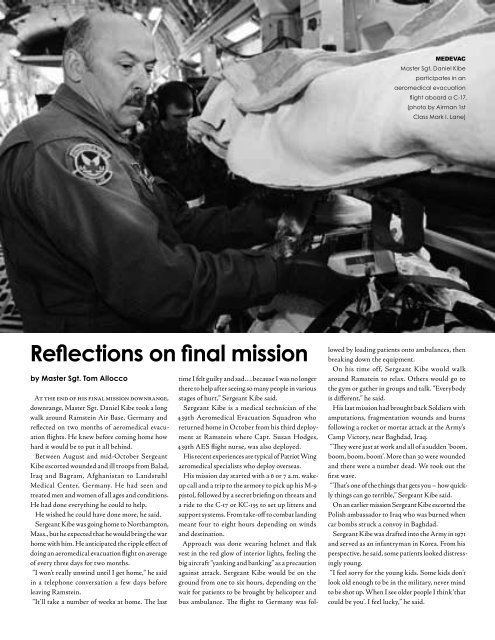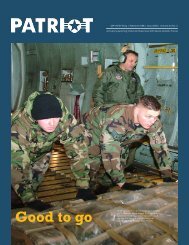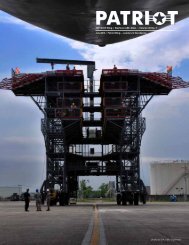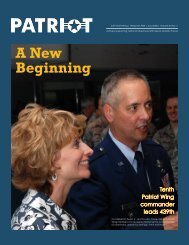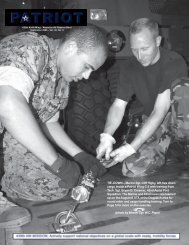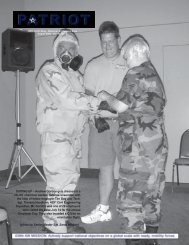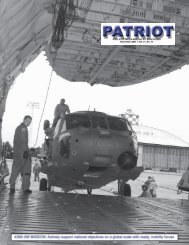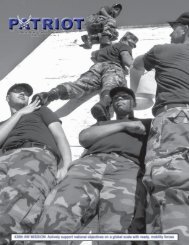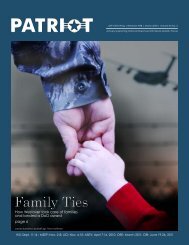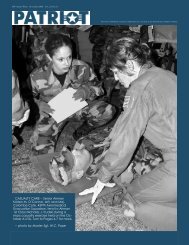Take careof the people and the peoplewill take care of the mission
Take careof the people and the peoplewill take care of the mission
Take careof the people and the peoplewill take care of the mission
Create successful ePaper yourself
Turn your PDF publications into a flip-book with our unique Google optimized e-Paper software.
PATRIOT | PAGE MEDEVACMaster Sgt. Daniel Kibeparticipates in anaeromedical evacuationflight aboard a C-17.(photo by Airman 1stClass Mark I. Lane)Reflections on final <strong>mission</strong>by Master Sgt. Tom AlloccoAt <strong>the</strong> end <strong>of</strong> his final <strong>mission</strong> downrange,downrange, Master Sgt. Daniel Kibe took a longwalk around Ramstein Air Base, Germany <strong>and</strong>reflected on two months <strong>of</strong> aeromedical evacuationflights. He knew before coming home howhard it would be to put it all behind.Between August <strong>and</strong> mid-October SergeantKibe escorted wounded <strong>and</strong> ill troops from Balad,Iraq <strong>and</strong> Bagram, Afghanistan to L<strong>and</strong>stuhlMedical Center, Germany. He had seen <strong>and</strong>treated men <strong>and</strong> women <strong>of</strong> all ages <strong>and</strong> conditions.He had done everything he could to help.He wished he could have done more, he said.Sergeant Kibe was going home to Northampton,Mass., but he expected that he would bring <strong>the</strong> warhome with him. He anticipated <strong>the</strong> ripple effect <strong>of</strong>doing an aeromedical evacuation flight on average<strong>of</strong> every three days for two months.“I won’t really unwind until I get home,” he saidin a telephone conversation a few days beforeleaving Ramstein.“It’ll <strong>take</strong> a number <strong>of</strong> weeks at home. The lasttime I felt guilty <strong>and</strong> sad….because I was no longer<strong>the</strong>re to help after seeing so many <strong>people</strong> in variousstages <strong>of</strong> hurt,” Sergeant Kibe said.Sergeant Kibe is a medical technician <strong>of</strong> <strong>the</strong>439th Aeromedical Evacuation Squadron whoreturned home in October from his third deploymentat Ramstein where Capt. Susan Hodges,439th AES flight nurse, was also deployed.His recent experiences are typical <strong>of</strong> Patriot Wingaeromedical specialists who deploy overseas.His <strong>mission</strong> day started with a 6 or 7 a.m. wakeupcall <strong>and</strong> a trip to <strong>the</strong> armory to pick up his M-9pistol, followed by a secret briefing on threats <strong>and</strong>a ride to <strong>the</strong> C-17 or KC-135 to set up litters <strong>and</strong>support systems. From <strong>take</strong>-<strong>of</strong>f to combat l<strong>and</strong>ingmeant four to eight hours depending on winds<strong>and</strong> destination.Approach was done wearing helmet <strong>and</strong> flakvest in <strong>the</strong> red glow <strong>of</strong> interior lights, feeling <strong>the</strong>big aircraft “yanking <strong>and</strong> banking” as a precautionagainst attack. Sergeant Kibe would be on <strong>the</strong>ground from one to six hours, depending on <strong>the</strong>wait for patients to be brought by helicopter <strong>and</strong>bus ambulance. The flight to Germany was followedby loading patients onto ambulances, <strong>the</strong>nbreaking down <strong>the</strong> equipment.On his time <strong>of</strong>f, Sergeant Kibe would walkaround Ramstein to relax. O<strong>the</strong>rs would go to<strong>the</strong> gym or ga<strong>the</strong>r in groups <strong>and</strong> talk. “Everybodyis different,” he said.His last <strong>mission</strong> had brought back Soldiers withamputations, fragmentation wounds <strong>and</strong> burnsfollowing a rocket or mortar attack at <strong>the</strong> Army’sCamp Victory, near Baghdad, Iraq.“They were just at work <strong>and</strong> all <strong>of</strong> a sudden ‘boom,boom, boom, boom’. More than 30 were wounded<strong>and</strong> <strong>the</strong>re were a number dead. We took out <strong>the</strong>first wave.“That’s one <strong>of</strong> <strong>the</strong> things that gets you – how quicklythings can go terrible,” Sergeant Kibe said.On an earlier <strong>mission</strong> Sergeant Kibe escorted <strong>the</strong>Polish ambassador to Iraq who was burned whencar bombs struck a convoy in Baghdad.Sergeant Kibe was drafted into <strong>the</strong> Army in 1971<strong>and</strong> served as an infantryman in Korea. From hisperspective, he said, some patients looked distressinglyyoung.“I feel sorry for <strong>the</strong> young kids. Some kids don’tlook old enough to be in <strong>the</strong> military, never mindto be shot up. When I see older <strong>people</strong> I think ‘thatcould be you’. I feel lucky,” he said.


